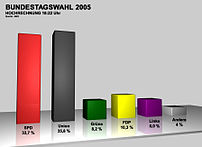EFCA: Americans are Mostly For or Against It
 Image via Wikipedia
Image via Wikipedia
It really just depends who asks the question, who you put the question to, and how you ask the question.
Take a look at this post from TPMMuckraker called EFCA Polls: Yet Again it all Comes Down to the Question. It reminds of the old saw of never ask someone if their salary is high enough because you already know the answer to your own question!
EFCA Polls: Yet Again, It All Comes Down To The Question
Here's yet another object lesson in how much the phrasing of a poll can
affect the results -- this time on the proposed Employee Free Choice Act, also
known as card-check.
First, let's look at a new Gallup
poll:
Generally speaking, would you favor or oppose a new law that would make
it easier for labor unions to organize workers? Favor 53% Oppose 39%
This one suggests that people are certainly favorable to unions -- but
on the other hand, it doesn't tell us anything about how the specifics of EFCA
would play out. Indeed, the pollster's analysis points out that it should be
troubling for labor that only 53% are supportive, before the specifics are
debated.
Next up is the new Rasmussen
poll, showing some serious antipathy to EFCA. Let's look at how they phrased
not just one question -- but three of them.
Here's the first question:
Should Congress change the law to make it easier for workers to form or
join a labor union?
33% Yes 40% No 27% Not sure
The phrasing here is different from Gallup's -- it doesn't ask what you
think about a proposal, but about what Congress should do.
And it focuses on a specific act -- Congress changing the law -- rather
than the generality in Gallup. And thus we have a huge difference in the
results.
That might normally be dismissed as a piece of natural variation
between pollsters. But it gets more and more interesting from there:
Under current law, if enough workers express interest in forming a
union, a secret ballot is held. Is it fair to require a secret ballot to
determine if workers want to form a union?
61% Yes 18% No22% Not sure
Of course, who doesn't like democracy? Some of those 18% who said no
were probably pro-EFCA respondents who sensed, consciously or not, where this
was going next:
Some people believe that a secret ballot vote is not necessary and that a
union should be formed whenever a majority of workers sign a card saying they
want one. If a majority of a company's workers sign a card saying they want to
form a union, is it fair to form a union without having a vote?
32% Yes 52% No 16% Not sure
Having primed the pump with a question about secret ballots, we're now
expressly presented with the idea of not getting to vote. And so starting from
61% saying they want a secret ballot, we get 52% opposing card-check.
![Reblog this post [with Zemanta]](http://img.zemanta.com/reblog_b.png?x-id=3e3fbe2a-2b3f-4ea8-9183-5ef85c4030ea)


Comments
Post a Comment
We appreciate your thoughts on the blog. Please add your comments. It helps keep the place interesting!
Everything you post will be read, and responded too!
-- Michael VanDervort